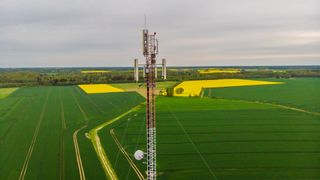UK gov proposes new 5G laws to tackle rural blindspots
The regulation shake-up aims to create better opportunities for the UK’s rural economy

The UK government is taking on mobile signal blindspots in rural parts by introducing new regulations that will make it easier for telecom operators to roll out 5G connectivity.
This will include allowing mobile operators to make new and existing masts up to five metres taller and two metres wider than current rules permit, in order to increase the range of masts and make it possible to fit more equipment on them.
While existing masts will be able to be upgraded to 5G without prior permission, new masts will still be subject to approval by planning authorities. Existing masts will be extended from 20 metres to 25 metres in height, while new masts will be allowed to reach a threshold of 30 metres, or a maximum of 25 metres in protected areas such as national parks, conservation areas, areas of outstanding natural beauty, and world heritage sites.
The newly proposed measures aim to create better opportunities for the UK’s rural economy as well as help to improve the quality of life in the countryside. They will also benefit drivers relying on mobile connectivity for GPS navigation on rural roads and highways.
Commenting on the announcement, digital secretary Oliver Dowden said the government aims to “end the plague of patchy and poor mobile signals in rural communities” and “propel villages and towns out of the digital dark ages - providing a welcome boost for millions of families, businesses and visitors”.
“These practical changes strike a careful balance between removing unnecessary barriers holding back better coverage, while making sure we protect our precious landscape,” he added.
CCS Insight director of consumer and connectivity, Kester Mann, described the news as “long overdue, but hugely welcome news for rural communities, where the COVID-19 pandemic has only served to highlight a worrying digital divide”.
Get the ITPro. daily newsletter
Receive our latest news, industry updates, featured resources and more. Sign up today to receive our FREE report on AI cyber crime & security - newly updated for 2024.
“Dated planning laws have hindered mobile network deployment for years, most recently threatening the UK’s strong start in 5G. Taller masts enable signals to travel further, providing coverage to residents and visitors over a wider area. But it’s vital to strike the right balance between improving connectivity and preserving the beauty of the countryside.”
Mann added that, although the UK’s mobile industry “will say there is still more the government can do to foster a better connected Britain”, it is still “heartening to finally see a clear focus on removing unnecessary barriers to help make mobile services available to all”.
“The pandemic has highlighted the pressing need for UK homes and businesses to access high quality and reliable connectivity; many will hope today’s announcement is the first of many,” he added.
The consultation period for the government’s newly proposed measures is to run for eight weeks, closing on 14 June 2021.
Having only graduated from City University in 2019, Sabina has already demonstrated her abilities as a keen writer and effective journalist. Currently a content writer for Drapers, Sabina spent a number of years writing for ITPro, specialising in networking and telecommunications, as well as charting the efforts of technology companies to improve their inclusion and diversity strategies, a topic close to her heart.
Sabina has also held a number of editorial roles at Harper's Bazaar, Cube Collective, and HighClouds.
Most Popular







